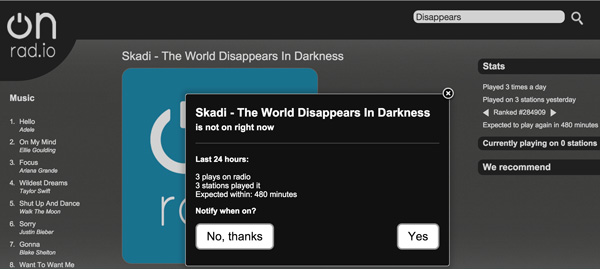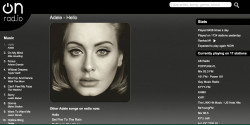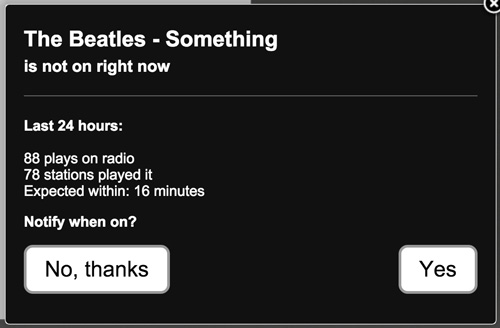Serial music and radio entrepreneur Michael Robertson is back with a new platform that updates and replaces his Radio Search Engine idea, with a focus on making it easier to share songs on social media. Radio Search Engine was exactly what it sounded like, a sort of Google for radio, which let you search for any artist and song that might be playing on an internet radio station, anywhere in the world, and then playing it on that station nearly instantaneously.
The new OnRad.io takes that search engine and gives it a more simplified interface that also kicks out some interesting stats. The sharing functionality comes with adding an artist or song name to the OnRad.io URL. So, going to http://onrad.io/The.Weeknd.Cant.Feel.My.Face brings up the Weeknd’s hit “Can’t Feel My Face” playing somewhere on the interwebs, while http://onrad.io/scorpions will deliver a track from these German hard rockers. Then use that URL on any social platform you like, from Twitter to Snapchat.
The platform is available in the web browser and as a mobile app on iOS or Android. Though the search function is the same on any device, OnRad.io functions a little differently on mobile than on the web.
Finding the Hits, Missing the Rarities
Regardless of device OnRad.io works well for popular songs and artists, which it appears the service is tuned for. Looking for Adele’s newest single, “Hello”? No problem. You’re most definitely in luck. But looking for the Chicago shoegaze band Disappears on the web version? Less lucky. Even though OnRad.io autocompletes the band’s name in search–indicating that its in the platform’s database–the result it comes back with is Skradi’s “The World Disappears in Darkness,” which itself isn’t a particularly popular track, from a comparatively obscure artist. Using the iOS app I couldn’t find Disappears at all, instead getting a list of songs that bore no obvious relation to what I was searching for.

OnRad.io thinks Disappears only means this one obscure song.
Artist searches on the web version appear to default to the most popular track. For instance, every search I made for the Scorpions brought up their 1989 hit “Wind of Change.” Searching for the Beatles only resulted in “Let It Be.” However, if that particular song wasn’t playing then nothing played, even if a dozen other Beatles songs were playing at that same time. To hear one of those, like “Something,” I had to say “no, thanks” to being notified when “Let It Be” is on again, and then select that track from the “other Beatles songs on radio now” list.
Artist search on iOS is more logical, resulting in a list of an artist’s songs playing right now, rather than autoplaying the most popular one in heavy rotation.
Mostly Designed for Sharing
To me it’s a curious omission that there are no sharing buttons in the OnRad.io interface, whether on the web or in the app. Given its focus on sharing tracks, I otherwise would have assumed there would be buttons to instantly post to Twitter, Facebook, and the like. I understand that the simple URL syntax makes it easy to copy and paste it from the browser into a message, but a share button would encourage this social use even more.
Sharing buttons are all the more important when using the app, since the URL isn’t displayed, and isn’t available for copying to paste into the Twitter or Snapchat app. While I can easily figure out the right URL to type out, I think that’s asking a little too much in an environment where users have been trained to simply tap a couple times to share just about any content.
Fascinating Stats
As I alluded earlier, OnRad.io provides some fascinating statistics in the web version that give an eye in to how repetitive and limited music radio can be–eve online. For every track it displays how many times it was played today, and on how many stations. It also shows when the track can be expected to play again.
My guess is that estimate is based on simply dividing 24 by the number of times the track is played in a day. OnRad.io told me that The Beatles’ “Something” is played 88 times a day, and I could expect it to play again in 16 minutes. Divide 24 by 88 and you get once every .27 hours, or every 16 minutes. And what about Adele’s newest single? OnRad.io says it’s played 6458 times a day, and therefore it is “expected to play again NOW” (or, roughly once every 13 seconds).
The Tech Is Still Impressive When It Works
As I noted when Radio Search Engine debuted two years ago, it’s impressive that it works at all, and is all the more impressive that OnRad.io’s hit rate is pretty high, with songs starting pretty close to their beginning, playing back close to immediately. If a song or artist is not on right now you’re presented with other songs by the artist that are playing now, and given the option to be alerted when your specific song starts playing somewhere. This alert only happens within OnRad.io–you don’t need to hand over an email (which probably would be too slow to be useful), phone number or social media account. Of course, that means that if you browse away from the OnRad.io site you’ll miss the alert.
The times when things don’t quite work out and you don’t hear what you expected mostly seem to be due to faulty metadata coming from stations, where that metadata is either wrong or out-of-sync with the stream. I also found the occasional station that runs an automatic pre-roll announcement or ad that will play before your desired track. Again, that’s not under OnRad.io’s control, though those stations could be removed from the database in order to cut down on this annoyance.
Who’s It For?
Robertson says that OnRad.io is intended to help listeners find and share music while also ensuring artists get their due, since online radio stations are required to pay both songwriting and performance royalties (at least in the US and E.U.). He also says radio companies stand to benefit from listeners being directed to their stations, which he argues may help them compete with the likes of Spotify and Pandora.
Spotify and YouTube are probably two of the most popular ways to share songs on social media, which OnRad.io clearly has in its sights. However, as cool as the ability to search and share online radio is, I’m still not convinced that OnRad.io has what it takes to change the habits of a significant number of millennials using social media. My doubts have nothing to do with the platform itself, or its functionality. Rather, internet users have been trained to turn to YouTube and Spotify to find music, due to marketing, social sharing, and outright ubiquity.
Even though OnRad.io works pretty well, I’m not sure it works better than YouTube or Spotify, even taking into account that listeners suffer ads on those competitors. Furthermore, whether I like it or not, I’m unconvinced that concerns about artist royalties will move the needle much for all but a fringe number of listeners.
Nevertheless, OnRad.io is a fun app to play with. It’s a worth using when you absolutely must hear a particular song or artist right now, and you otherwise don’t have easy access to a paid on-demand music service.




